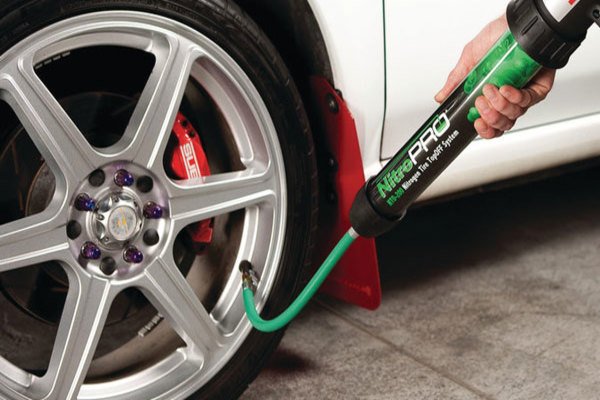In recent years, there has been a growing debate over the use of nitrogen-filled tires in place of traditional air-filled tires. Proponents claim that nitrogen provides numerous benefits such as improved fuel efficiency, longer tire life, and increased safety. However, skeptics argue that the added cost of filling tires with nitrogen outweighs any potential advantages. So, what is the truth behind this ongoing debate? Is it really worth paying extra for nitrogen-filled tires?
Nitrogen-Filled Tires vs Air-Filled Tires:
To understand the argument for and against nitrogen-filled tires, we must first look at how they differ from traditional air-filled tires. The main difference between the two is the composition of the gas used to fill them. While air contains approximately 78% nitrogen, it also includes other gases such as oxygen, water vapor, and trace amounts of other elements. On the other hand, nitrogen-filled tires contain almost pure nitrogen with little to no presence of other gases.
Benefits of Nitrogen-Filled Tires:
Proponents of nitrogen-filled tires argue that the use of pure nitrogen provides several benefits over traditional air-filled tires. One significant advantage is improved fuel efficiency. As nitrogen molecules are larger than oxygen molecules, they are less likely to seep out of the tire, resulting in better pressure retention and ultimately leading to improved fuel efficiency.
Additionally, nitrogen is a dry gas, meaning it does not contain water vapor. This helps to reduce the buildup of moisture inside the tire, which can cause rust and corrosion on the metal rims and lead to a decrease in tire life.
Safety is another aspect where nitrogen-filled tires are said to have an edge over air-filled tires. Nitrogen is less prone to expansion and contraction with temperature changes, reducing the risk of tire blowouts or loss of pressure. This makes them a safer option, particularly for heavy-duty vehicles that are more susceptible to tire failures.
Drawbacks and Controversy:
Despite the touted benefits, there are some significant drawbacks to nitrogen-filled tires that have sparked controversy over their use. The most significant disadvantage is the added cost of filling tires with nitrogen. While air is readily available and essentially free, nitrogen must be bought and stored in tanks, making it a more expensive option.
Skeptics also argue that the benefits of nitrogen-filled tires are negligible and can only be noticed in extreme conditions. They claim that regular air-filled tires already provide sufficient pressure retention and safety features and do not justify the additional cost of using pure nitrogen.
Is it Worth the Extra Cost?
So, is it really worth paying extra for nitrogen-filled tires? The answer ultimately depends on your driving habits and priorities. If you are a frequent driver who values improved fuel efficiency and safety, the added cost of nitrogen-filled tires may be worth it for you. On the other hand, if you have a more conservative driving style and do not want to incur the additional expense, air-filled tires may be a better option.
In conclusion, the debate over nitrogen-filled tires continues to rage on, with valid arguments on both sides. While there are clear benefits to using pure nitrogen in tires, the added cost is a significant deterrent for many drivers. Ultimately, it comes down to personal preference and priorities when making the decision between air-filled or nitrogen-filled tires. Whichever option you choose, regular tire maintenance and proper inflation are crucial for ensuring a safe and efficient driving experience. So, make sure to regularly check your tire pressure, regardless of the type of gas used to fill them.
Aside from the debate over nitrogen-filled tires, there are other factors that can impact tire performance and safety. These include tread depth, tire age, and driving habits. It is essential to regularly check these factors and replace tires as needed to ensure optimal performance and safety on the road.
Moreover, while nitrogen-filled tires may provide some benefits, it is crucial to note that they are not a cure-all solution for all tire-related issues. Regular maintenance and proper care are still necessary for maintaining safe and efficient tires, regardless of the gas used to fill them.
So, whether you choose to use nitrogen-filled or air-filled tires, remember to prioritize regular tire maintenance and make informed decisions based on your driving habits and priorities. Ultimately, the debate over which type of gas is best for filling tires may continue, but what truly matters is taking care of your tires for a safe and enjoyable driving experience. So, the next time you're due for a tire change, weigh your options and make the best decision for your specific needs. Happy driving!




